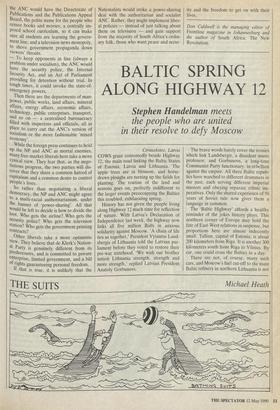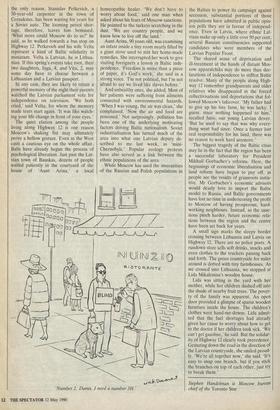BALTIC SPRING ALONG HIGHWAY 12
Stephen Handelman meets
the people who are united in their resolve to defy Moscow
Cerauskstes, Latvia COWS graze contentedly beside Highway 12, the main road linking the Baltic States of Estonia, Latvia and Lithuania. The apple trees are in blossom, and horse- drawn ploughs are turning up the fields for planting. The routine of the land and seasons goes on, perfectly indifferent to the larger events preoccupying the Baltics this troubled, exhilarating spring.
History has not given the people living along Highway 12 much time for reflection of nature. With Latvia's Declaration of Independence last week, the highway now links all five million Baits in anxious solidarity against Moscow. 'A chain of life ties us together,' President Vytautas Land- sbergis of Lithuania told the Latvian par- liament before they voted to restore their pre-war statehood. 'We wish our brother nation Lithuania strength, strength and more strength,' replied Latvian President Anatoly Gorbunovs. The brave words barely cover the ironies which link Landsbergis, a dissident music professor, and Gorbunovs, a long-time Communist Party functionary, in rebellion against the empire. All three Baltic repub- lics have marched to different drummers in the past, each serving different imperial masters and obeying separate ethnic im- peratives. Only the shared experience of 50 years of Soviet rule now gives them a language in common.
The 'Baltic Highway' affords a healthy reminder of the jokes history plays. This northern corner of Europe may hold the fate of East-West relations in suspense, but proportions here are almost indecently small. Tallinn, capital of Estonia, is about 200 kilometers from Riga. It is another 300 kilometers south from Riga to Vilnius. By car, one could cross the Baltics in a day.
There are not, of course, many such cars, and Moscow's fuel cut-off to the main Baltic refinery in northern Lithuania is not the only reason. Stanislav Petkevich, a 30-year-old carpenter in the town of Ceraukstes, has been waiting for years for a Soviet auto. The looming petrol shor- tage, therefore, leaves him bemused. 'What more could Moscow do to us?' he said, as he walked towards a bus stop on Highway 12. Petkevich and his wife Velta represent a kind of Baltic solidarity in miniature. Velta is Latvian, he is Lithua- nian. If this spring's events take root, their two daughters, Inga, 4, and Vita, 2, may some day have to choose between a Lithuanian and a Latvian passport.
In any case, they are likely to retain a powerful memory of the night their parents watched the Latvian parliament vote for independence on television. 'We both cried,' said Velta, for whom the memory made tears start again. 'It was like watch- ing your life change in front of your eyes.'
The quiet elation among the people living along Highway 12 is one reason Moscow's shaking fist may ultimately prove a hollow gesture. Even as the West casts a cautious eye on the whole affair, Batts have already begun the process of psychological liberation. Just past the Lat- vian town of Bauskas, dozens of people waited patiently in the courtyard of the house of 'Aunt Arina,' a local homeopathic healer. 'We don't have to worry about food,' said one man when asked about his fears of Moscow sanctions. He pointed to the turkeys scratching in the dust. 'We are country people, and we know how to live off the land.'
Aunt Arina, 90 years old, was examining an infant inside a tiny room nearly filled by a giant stove used to mix her home-made remedies. She interrupted her work to give visiting foreigners a lesson in Baltic inde- pendence. 'Freedom is more than a piece of paper, it's God's work,' she said in a strong voice. 'I'm not political, but I'm not afraid to say we lived like slaves before.'
And unhealthy ones, she added. Most of her patients were suffering from ailments connected with environmental hazards. 'When I was young, the air was clean,' she complained. 'Now the air and food are poisoned.' Not surprisingly, pollution has been one of the underlying motivating factors driving Baltic nationalism. Soviet industrialisation has turned much of the area into what one Latvian deputy de- scribed to me last week, as 'mini- Chernobyls.' Popular ecology protests have also served as a link between the ethnic populations of the area.
While Moscow has used the insecurities of the Russian and Polish populations in 'Number 2. Damn. I need a number 3H.' the Baltics to power its campaign against secession, substantial portions of those populations have admitted in public opin- ion polls they are in favour of independ- ence. Even in Latvia, where ethnic Lat- vians make up only a little over 50 percent, several Russian constituencies supported candidates who were members of the Latvian Popular Front.
The shared sense of deprivation and ill-treatment at the hands of distant Mos- cow apparatchiks may do more than dec- larations of independence to stiffen Baltic resolve. Many of the people along High- way 12 remember grandparents and older relatives who disappeared in the forced collectivisations and deportations that fol- lowed Moscow's takeover. 'My father had to give up his tiny farm, he was lucky, I guess, since nothing happened to him,' recalled Juris, our young Latvian driver. 'But he used to say that was why every- thing went bad since. Once a farmer lost real responsibility for his land, there was no reason to work hard anymore.'
The biggest tragedy of the Baltic crisis may lie in the fact that the region has been a successful laboratory for President Mikhail Gorbachev's reforms. Here, the beginnings of economic liberalisation and land reform have begun to pay off, as people see the results of grassroots initia- tive. Mr Gorbachev's economic advisors would dearly love to import the Baltic model to Russia, and Baltic governments have lost no time in underscoring the profit to Moscow of having prosperous, hard- working neighbours. Instead, as the sanc- tions pinch harder, future economic rela- tions between the region and the centre have been set back for years.
A small sign marks the sleepy border crossing between Lithuania and Latvia on Highway 12. There are no police posts. A rundown store sells soft drinks, snacks and even clothes to the truckers passing back and forth. The green Countryside for miles around is dotted with tiny farmhouses. As we crossed into Lithuania, we stopped at Lida Mikalenina's wooden house.
Lida was sitting in the yard with her mother, while her children dashed off into the shade of nearby fruit trees. The pover- ty of the family was apparent. An open door provided a glimpse of sparse wooden furniture inside the house. The children's clothes were hand-me-downs. Lida admit- ted that the fuel shortages had already given her cause to worry about how to get to the doctor if her children took sick. 'We can't get gasoline,' he said. But the solidar- ity of. Highway 12 clearly took precedence. Gesturing down the road in the direction of the Latvian countryside, she smiled proud- ly. 'We're all together now,' she said. 'It's easy to snap one branch, but if you stick the branches on top of each other, just try to break them.'
Stephen Handelman is Moscow bureau chief of the Toronto Star





























































 Previous page
Previous page